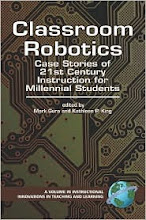Wednesday, January 30, 2008
Paro is more than a therapeutic robot; Paro IS a Baby Seal!
From CNN.com
"Meet Paro, the therapeutic robot seal"
"Paro is a harp seal stuffed animal robot, developed by Japan's National Institute of Advanced Industrial Science and Technology. Engineer Takanori Shibata said Paro prototypes are being tested in Japan and Sweden at nursing homes, and with autistic and handicapped children.
"We know that pet therapy helps physically, psychologically and socially, and Paro does the same thing for people who are unable to care for a live pet," said Shibata.
Surface tactile sensors beneath its fur and whiskers trigger Paro to move and respond to petting: eyes open and close, flippers move. Just holding and stroking the critter has a calming effect, as Comdex (Computer Dealer Expo) visitors who checked it out soon discovered.
"We found nursing home residents also opened up and talked with each other about pets they had owned," said Shibata. And, he said, their stress levels went down.
Paro may soon be tested in children's hospitals in the United States. It's expected to cost between $2,500 and $3,000.
Read full article @ its source:http://www.cnn.com/2003/TECH/ptech/11/20/comdex.bestof/
"Elders finding love in a household machine
Seemingly sentient robots can fill void, researchers say"
"Until recently, Dorothy Light of West Lafayette, Ind., described herself as a 74-year-old lonely widow. She had said goodbye to her home and even her cat when she moved into a senior apartment building that doesn't allow pets.
But she's not lonely anymore, Light said, thanks to a new live-in companion that makes her feel loved. Never mind that her companion isn't capable of love, since it's just a robot that looks like a dog. What matters in her opinion is that loving feeling she gets when Big Boy sits in her lap or nuzzles beneath her arm.
''I had lost my identity" with no husband, pets, or children at home to nurture, she said.
The AIBO from Sony ''gives me a sense of identity," Light said. ''The dog loves me all the time. . . . It gives me an entrée into a world I had thought I'd lost forever."
Light got Big Boy from Purdue University, one of several institutions studying how elders interact with robotic pets. With nursing homes experiencing labor shortages and with the over-65 population projected to double by 2050, scientists are asking whether machines designed to seem sentient could provide a low-maintenance means of improving the emotional lives of seniors.
Some researchers are hopeful. A study completed last year at Purdue found that ''life satisfaction" scores improved in six out of 10 categories among 13 elders who had kept an AIBO in their apartments six weeks.
At Teikyo University of Science and Technology in Japan, researchers in ''robot-assisted therapy" have found that robotic pets in nursing homes stir positive memories of pets that residents once owned. Researchers from MIT found that nursing home residents would rather play with robots than dolls, because robots seem valued as grown-up activity.
But the semblance of sentience in these therapeutic robots has raised ethical questions. Is it right for anyone who feels desperately lonely or depressed to gain relief in an illusion? Would it be fair to use robots, which appear to have feelings, among elders with dementia who might think they're dealing with a real animal?.."
Read full aticle @ its source:
http://www.boston.com/business/globe/articles/2006/04/03/elders_finding_love_in_a_household_machine?mode=PF
Subscribe to:
Post Comments (Atom)



No comments:
Post a Comment